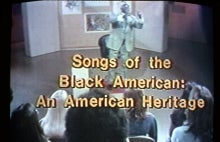Highlights from the Ethnomusicology Archive: The Bette Cox Collection

Bette Yarbrough Cox was a music educator in Los Angeles for more than 30 years, the founder of the BEEM (Black Experience Expressed through Music) Foundation for the Advancement of Music, a Commissioner of Cultural Affairs for the City of Los Angeles, and a longtime friend of former Mayor Tom Bradley.
As she recalled to the Los Angeles Times in 1995, the school district first accepted the teaching of Black history in the late 1960s, a seismic shift from her UCLA undergraduate days in 1938. To enhance her classroom curriculum, Cox looked for books about the Black history of music in Southern California. Her search through the usual channels – library shelves, newspaper clippings, etc. – came up mostly empty. Cox decided to do something about this lacuna and spent the next 20 years unearthing the untold history behind the music of Black Los Angeles.
The Cox collection consists of 37 Super-8 films, 24 U-matic tapes, seven audio cassettes, three boxes of slides, and one box of handwritten personal papers. The collection includes interviews, performances, cultural events, church services, and more. The names of Cox’s interviewees read like a Who’s Who of the Los Angeles African American community: musician and educator Sam Browne, the first Black educator to teach music in Los Angeles public high schools; jazz artists Buddy Collette and Marl Young, who were among the first Black musicians to perform and serve as music directors of Hollywood studio bands, including The Groucho Marx TV Show and You Bet Your Life (with Collette), and the Desilu TV productions of I Love Lucy and Here's Lucy (with Young), Young, a labor activist, and Collette were also key figures in desegregating L.A. musicians unions; music conductor Albert McNeil, whose group, the Albert McNeil Jubilee Singers, were hired by the U.S. State Department and the U.S. Information Service as "cultural ambassadors" to Asia, Europe, North and West Africa, the Middle East, and South America; premiere concert violinist, Bessie Williams Dones; and actor Jester Hairston, one of the first African American members of the Screen Actors Guild and among the first Black conductors to conduct choirs that performed background music for Hollywood movies.

Jester Hairston, image from the Bette Cox collection
Jester Hairston (1901-2000) was born in Belews Creek, North Carolina. When he was young, his parents moved to Homestead, Pennsylvania, where Hairston was raised. Hairston began his college education in 1920 at the University of Amherst (formerly Massachusetts Agricultural College), but later transferred to Tufts University where he received a degree in music in 1929. His first job was assistant principal of a music school in New York as part of the Works Progress Administration (WPA). In 1932-33, he joined the Hall Johnson Choir. In 1935 the choir was commissioned to perform in Warner Brothers' Green Pastures. Hairston moved to Los Angeles in 1936 where he established a successful career as an actor and choir conductor for film music. In 1949, Hairston began to arrange spirituals and compose when he worked at the College of the Pacific each summer.
As Professor Jacqueline Cogdell DjeDje wrote on seeing this image from the Cox collection:
This is a photo of the great actor, music composer, arranger, and choral conductor Jester Hairston. I regularly use his music in two classes that I teach: "African American Musical Heritage" and "African American Music in California." Although Hairston had small parts in several films, he was a prolific arranger of spirituals. Not only did he create the well known arrangement of the spiritual, "Amen," for the film, Lilies of the Field, starring Sidney Poitier, he was also well known for his acting career in radio (Amos 'n' Andy) and TV (Amos 'n' Andy, Amen, and That's My Mama). In addition to being actively involved in the Los Angeles community as a conductor and arranger of spirituals, he traveled extensively to various parts of the world introducing and conducting spirituals. In fact, the arrangements of his spirituals continue to be performed nationally and globally.
"Amen" in Lilies of the Field -- Sir Sidney Poitier, KBE, won the 1963 Oscar® for Best Actor for his performance in Lilies of the Field, but it was Hairston who provided Homer Smith's singing voice.
Hairston performing "Amen" at a concert in Odense, Denmark, April 28, 1981
Digitization of the Cox materials was made possible by a generous grant from the John Randolph Haynes and Dora Haynes Foundation. Ask for Collection 2009.01 in the Archive; and for details of the collection, check out the finding aid on the Online Archive of California (OAC).





